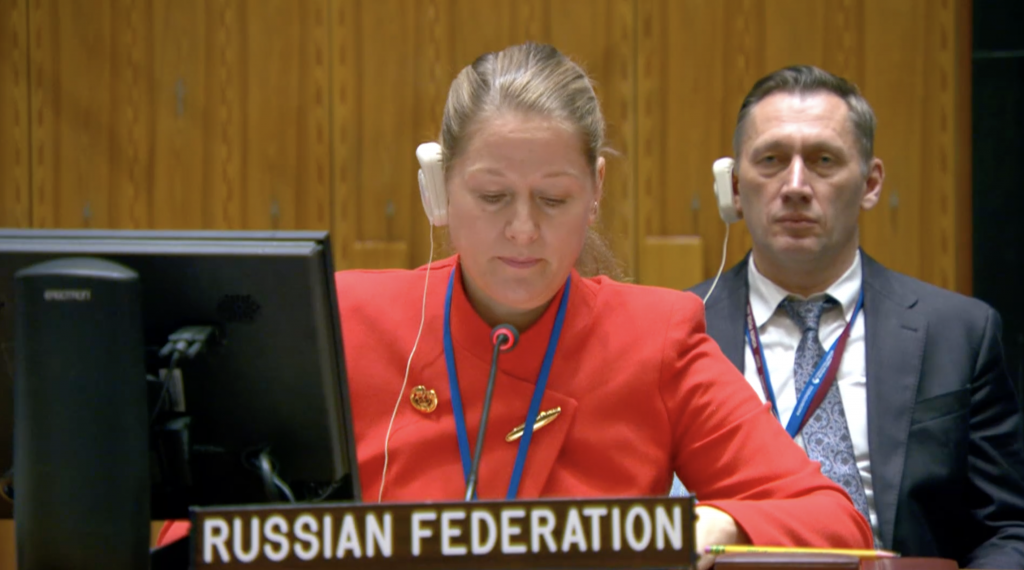Statement by Deputy Permanent Representative Maria Zabolotskaya at UNSC briefing by the UN High Commissioner for Refugees
Mr.President,
We are glad to welcome High Commissioner for Refugees Filippo Grandi to this meeting. We listened to his briefing with interest.
Assistance to refugees is an important area of international cooperation aimed at maintaining international peace, security and stability. The High Commissioner and the Office under his lead make a significant contribution to achieving these goals.
Russia is committed to its obligations with regard to refugees and is taking measures to assist persons seeking protection. We view the Global Compact on Refugees as a key instrument for consolidating the efforts of the international community to protect the rights and improve the situation of refugees. We aim to work constructively at the upcoming second Global Refugee Forum in Geneva in December.
We attach great importance to developing cooperation with the UN Refugee Agency, whose activities are particularly valuable in situations of major humanitarian crises.
We should like to express our special thanks to High Commissioner Grandi for drawing attention to the humanitarian crisis that is unfolding as a result of the Palestinian-Israeli conflict. As a practical contribution, among other things, Russia advocates increasing the share of the regular budget in UNRWA's expenditures. We call on all states to support that initiative. While talking about money, we would also like to mention that Russia has always contributed to UNHCR and is ready to do so now. However, our ability to do so is limited by unilateral restrictions, which we call to lift so we can transfer money for this purpose.
Mr.President,
The expanding geography of conflicts, poverty and economic inequality continue to cause exodus of people from their countries of origin. Among the reasons for such negative phenomena, we cannot but flag the interference in the internal affairs of states dictated by neocolonial approaches.
We attach great importance to further facilitation of voluntary return of Syrian refugees. According to OCHA, more than 50,000 Syrians returned to their country in 2022, which is almost 15,000 more than in the previous year. It is important that this number grows steadily. We believe that assistance in creating favorable conditions for the return of refugees and IDPs to places of permanent residence is an important step towards achieving long-term stabilization in Syria. We call on UNHCR to support the implementation of the initiative on the voluntary return of Syrian refugees to their homeland.
Mr.President,
We note the efforts of UNHCR to resolve the problems of Ukrainian IDPs and refugees. We recall that back in 2014, after the unconstitutional coup d'état in Kiev and the ascent to power of ultra-radical nationalists who unleashed a civil war against the people of Donbas, hundreds of thousands of Russian and Russian-speaking residents of Ukraine fled to Russia. The mass exodus from Ukraine to Russia continued in the following years in view of the unceasing shelling of peaceful cities of Donbas by Ukrainian armed forces. Since February 2022, more than 5 million people have left the Donetsk and Lugansk People’s Republics, Kherson and Zaporozhye regions and moved to other regions of Russia.
The Russian Federation is making every effort to receive and accommodate these persons and provide them with comprehensive assistance, including employment, enrollment in pre-school and schooling institutions for children, social payments and benefits. Persons arriving from these regions are provided with free medical care and medicines. They are entitled to simplified legal status procedures. UNHCR staff can see for themselves how effective our work is and what decent living conditions we offer to refugees.
Mr.President,
We should like to draw attention to the tragic situation of refugees from Africa who are forced to flee their homelands, which have been engulfed by conflict or destroyed by the irresponsible interference of Western states. Year to year, the Mediterranean Sea becomes a mass grave for many of those attempting to make it to Europe. Sometimes we come to witness terrible tragedies when vessels of EU coastal states choose to not stretch out a helping hand to people in distress, but deliberately push them out of their area of responsibility, condemning people to death. Some EU countries forbid humanitarian and non-governmental organizations that have boats at their disposal to come to aid too. At the end of the day, those who try to save lives are criminalized as complicit in human trafficking. The EU does everything it can to protect the "blooming garden", as Mr. Borrell puts it, against visitors from the jungle.
We have repeatedly raised this issue both from the international law perspective and from the point of view of basic humanity. People are dying, and there is no accountability. Involved in this are EU countries who very often speak in this Council about such things as responsibility and the inadmissibility of impunity. It is clear that the situation will not change unless there are safe ports of landing for refugees rescued and intercepted at sea, in accordance with international law of the sea. We ask the High Commissioner for Refugees to keep the Mediterranean region in focus of attention and to influence the European Union into compliance with its international obligations.
Thank you.
